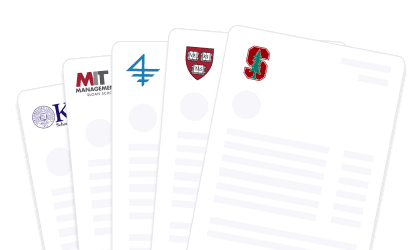What to Do if You Didn't Have an Internship This Summer
Internships have become increasingly vital for career development, and not securing one during the summer might lead to feelings of disappointment and uncertainty. This article aims to empower young professionals with alternative strategies and actionable steps to maximize their time and resources.
Posted June 27, 2025

Join a free event
Learn from top coaches and industry experts in live, interactive sessions you can join for free.
Table of Contents
Summer internships are often seen as the golden ticket to launching a successful career. They offer hands-on experience, networking opportunities, and a chance to test-drive a potential job path. But what if you didn’t land one this year? That’s okay, seriously. Not getting an internship doesn’t mean your summer has to feel like a failure or be wasted. In fact, it can be just the push you need to get creative and take ownership of your professional growth in new ways. The truth is, there are countless ways to make your summer valuable without an official internship. This time can be an open canvas, an opportunity to build real-world skills, dive into personal projects, and explore interests that formal internships might not allow. Whether it’s through online courses, volunteering, networking, or even starting your own blog or freelance gig, you can still walk away from the summer with meaningful experience and momentum toward your goals.
In this article, we’ll explore nine productive alternatives to summer internships. These ideas are not just time-fillers; they’re actionable strategies that can boost your resume, confidence, and clarity about what you want in your career. Let’s make this summer count in a way that’s completely your own.
Smart Ways to Maximize Your Summer Without an Internship
1. Pursue Online Courses and Skill Development
One of the best ways to spend your time these next few weeks is by investing in online courses and skill development programs. Leland has countless coaches with top-notch experience in a variety of different fields (investment banking, management consulting, private equity, you name it!) whose 1:1 sessions will allow you to acquire new skills and make you more competitive for future job opportunities. Check out a few of them below!
- Missy P. – Management Consulting / Stanford GSB ‘21 / McKinsey Alumna
- Ed Z. – Private Equity / Wharton MBA / Private Equity VP
- Tyler P. – Product Management / UCLA Alum / LinkedIn PM
- Michelle S. – Venture Capital / Stanford GSB / APM @ Google
- Kyle B. – Software Engineering / SWE @ Leland / SWE @ LinkedIn
2. Engage in Personal Projects
If you didn't have an internship this summer, consider working on personal projects that align with your interests or potential career path. Whether it's starting a blog, launching a YouTube channel, creating a portfolio website, or brainstorming on a small business idea, personal projects can demonstrate your initiative, creativity, and dedication to potential employers. They also show that you are motivated and committed to developing your skills, even in the absence of formal internship opportunities.
Note that personal projects don't have to be huge undertakings; even smaller undertakings can have a significant impact. The key is to choose projects that genuinely excite you and align with your career aspirations. Employers appreciate candidates who are genuinely passionate about their work, and personal projects provide the perfect outlet to showcase that enthusiasm.
3. Volunteer or Join Non-Profit Organizations
Embracing the spirit of giving back to the community can be an immensely rewarding and fulfilling experience, especially during the summer months. Instead of dwelling on not having an internship, consider spending your break volunteering with local charities, non-profit organizations, or community initiatives. Whether it's helping at a food bank, assisting with environmental conservation efforts, or supporting educational programs, volunteering offers a unique chance to contribute to a cause you genuinely care about.
In addition to the impact you make on the community, volunteering also serves as a fantastic opportunity for personal growth and skill development. Engaging in volunteer work enables you to nurture essential soft skills that are highly valued by employers in any professional setting. Through collaborative projects, you'll naturally enhance your teamwork capabilities, learning to work harmoniously with diverse groups of individuals who share the same passion for making a difference.
4. Network and Attend Virtual Events
Networking is crucial for career growth, and it doesn't have to be limited to in-person events. Attend virtual workshops, webinars, and conferences related to your field of interest. Networking events provide an opportunity to connect with professionals, mentors, and like-minded individuals who may offer valuable insights and open doors to future opportunities.
During these virtual gatherings, don't hesitate to actively engage and participate in discussions. Ask thoughtful questions and share your perspectives to leave a positive impression on other attendees. Demonstrating your passion and knowledge can make you memorable, leading to potential opportunities down the line.
5. Start a Freelance Gig
If you have specific skills like graphic design, writing, or social media management, consider freelancing. Websites like Upwork and Fiverr allow you to offer your services to a global market. Freelancing presents an excellent opportunity to hone your craft, gain practical experience, and build an impressive portfolio that can set you apart from other candidates in the future. As a freelancer, you have the freedom to choose the projects that align with your interests and strengths, allowing you to focus on what truly excites you.
Freelancing presents an excellent opportunity to hone your craft, gain practical experience, and build an impressive portfolio that can set you apart from other candidates in the future. As a freelancer, you have the freedom to choose the projects that align with your interests and strengths, allowing you to focus on what truly excites you.
6. Focus on Personal Development
Summer is an excellent time for self-reflection and personal growth. Engage in activities that promote mindfulness, well-being, and mental health. Take up hobbies like traveling, painting, yoga, meditation, or reading. These pursuits not only provide a sense of fulfillment but also contribute significantly to achieving a healthy and well-balanced mindset – a foundation that is crucial for overall success in life and your future career.
7. Conduct Informational Interviews
One of the most effective ways to make the most of your summer break without an internship is to reach out to professionals in your desired field and request informational interviews. These interviews are not job interviews but rather valuable opportunities to gain insights into their career journeys, industry experiences, and receive valuable tips for success. By conducting informational interviews, you can establish meaningful connections with seasoned professionals, experts, and mentors. These connections can prove to be invaluable when you eventually start applying for internships or jobs later on.
During these conversations, you can learn about the challenges and triumphs they faced, the skills and qualifications that are highly valued in the industry, and the latest trends and developments. Not only will you gain valuable knowledge about your field of interest, but you'll also gain confidence and build networking skills that will undoubtedly serve you well in your future endeavors. Remember to approach these interviews with genuine curiosity and gratitude for their time and expertise, and be open to learning from their experiences. So, don't hesitate to reach out to professionals in your field and start building relationships that can propel your career forward.
8. Reflect and Set Goals
Take time to reflect on your career aspirations and consider where you see yourself in the short-term and long-term. Identify the industries or fields that excite you the most and align with your passions and strengths. Reflecting on your interests and ambitions will help you gain clarity about the kind of internships and job opportunities you should seek in the future.
Next, conduct a thorough self-assessment to evaluate your strengths and areas for improvement. Recognize the skills and abilities that set you apart and make you a valuable asset in the job market. Are you a great communicator, a problem solver, or a natural leader? Acknowledging your strengths will boost your confidence and allow you to emphasize them during interviews and networking opportunities. Simultaneously, be honest about your weaknesses and areas where you could use improvement. This self-awareness will help you identify areas where you can focus on personal and professional growth during the remainder of the summer break.
9. Get Ahead on Applications for Next Summer
Believe it or not, many companies open internship applications months in advance, sometimes as early as the summer before. Getting ahead now gives you a major advantage. Start by identifying roles and companies that match your career goals, then update your resume, LinkedIn profile, and prepare a basic cover letter you can tailor later. Setting up job alerts, researching deadlines, and even scheduling informational interviews can help you stay organized and confident when applications go live. By preparing early, you’ll stand out and avoid the last-minute scramble many applicants face.
Bottom line
Even if you don’t have an internship this summer, there are still plenty of meaningful ways to grow personally and professionally. From taking online courses and launching personal projects to networking, volunteering, and preparing early for next year’s applications, every effort you make now builds momentum for your future. Use this time wisely, employers value initiative, and the steps you take today can open doors tomorrow.
Want help making your summer count?
Even without an internship, you can still move your career forward. Our career coaches can help you set goals, build your resume, prepare for interviews, and plan next summer’s applications. Book a 1:1 session today and make the most of your break.
Take a look at these resources to help you get started:
- An Expert’s Guide to Resumes: Five Tips to Make You Stand Out
- Tips from an Expert: How to Prepare for Your Product Management Interview
- How to Land a College Internship
- 25+ Questions To Ask At a Career Fair
- 10 Job-Ready Career Skills That Will Set You Apart
FAQs
What is the summer internship?
- A summer internship is a short-term work experience, usually lasting 8–12 weeks, where students gain hands-on experience in a field related to their career interests.
Is $20 an hour good for an internship?
- Yes, $20 per hour is considered a competitive rate for many internships, especially in business, tech, and finance.
Does internship mean paid?
- Not always, some internships are paid, while others are unpaid or offer academic credit instead of wages.
What is a good desired salary for a summer internship?
- A reasonable expected salary typically ranges from $15 to $25 per hour, depending on the industry, location, and your experience level.

































